Six Dads of LGBTQ Kids — Including Matthew Shepard's Father — Bond and Cry in New Doc (Exclusive)
- Oops!Something went wrong.Please try again later.
- Oops!Something went wrong.Please try again later.
- Oops!Something went wrong.Please try again later.
- Oops!Something went wrong.Please try again later.
Executive producer Dwyane Wade and director Luchina Fisher advocate for fathers of queer kids in The Dads, a new Netflix documentary short
There’s nothing quite like the bond of fatherhood in the great outdoors to tie the lives of six disparate dads together.
As the men stand along a restless river on an early Oklahoma morning in May 2022, it’s clear at first glance that they’re quietly enjoying nature on a fishing trip. With the mist still hanging in the air, the dads carefully tie their own lures before casting them out into the water.
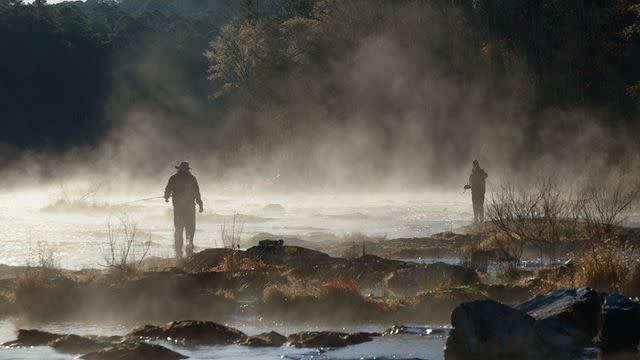
courtesy netflix
Two of the dads cast their fishing lines out to the river.Some are fishing for the first time, and others, like Dennis Shepard, have been doing it for for decades. The last time Shepard went fishing was in Wyoming's Bighorn Mountains with his son, Matthew Shepard, in 1998.
“It just brought back memories of fishing with my grandparents, with my folks, with the boys, teaching them how to fish,” the father of two sons fondly recalls to PEOPLE.
Yet, just a few months after that trip to Bighorn Mountains, his sense of peace would be shattered when Matthew, a 21-year-old college student, was brutally slain in an anti-gay hate crime — one that reverberated around the world and paved the way for sweeping hate-crime legislation.
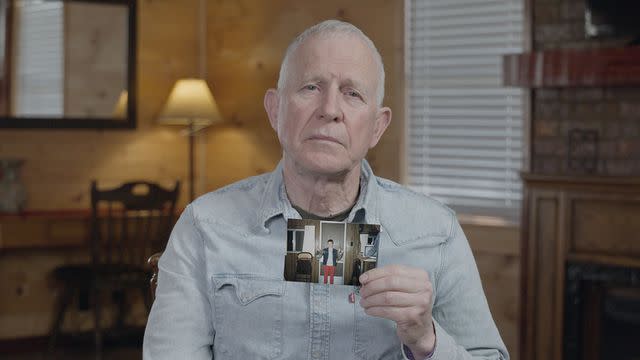
courtesy netflix
Dennis Shepard holding a photo of his son Matthew.Viewers ofThe Dads, the documentary short now streaming on Netflix, will quickly realize that for the six dads, the weekend fishing trip in Oklahoma, actually “wasn’t about fishing at all.”
It becomes more apparent when the men — Stephen Chukumba, Frank Gonzales, Jose Trujillo, Peter Betz, Wayne Maines and Shepard — gather afterward around a dining table. Over a shared breakfast of waffles, they begin to reveal the love, hopes and fears they have for their children.
As different as they are from one another (racially diverse, they come from various parts of the country, and most of them had never even met before the weekend trip), they all are connected by a common thread: the unconditional love they have for their transgender and gay children.
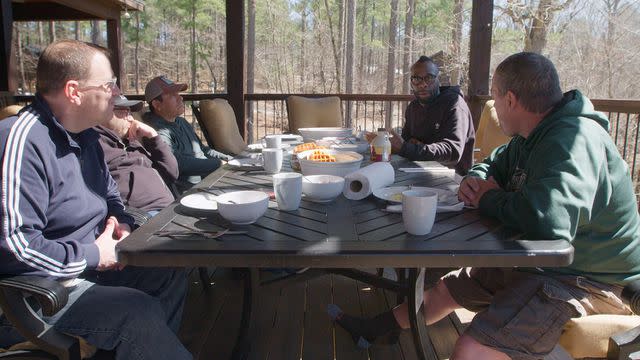
courtesy netflix
The dads talk about their shared experiences over a morning breakfast.As documented in the 10-minute short from director Luchina Fisher and executive producer Dwyane Wade, the trip offered a rare opportunity for the dads to be at their most truthful and vulnerable in a space full of understanding.
While temporarily shielded from a world where the civil rights of their children are being challenged, they not only shared their experiences as fathers of LGBTQ children, but also questioned what “fatherhood” and “manhood” really mean.
The roots of the trip were sown back in 2020, when Shepard and Maines, both of whom “have a love of the outdoors,” talked about going on a fishing trip. When Fisher overheard the “outdoorsmen” discuss their plans at the Human Rights Campaign’s LGBTQ Youth Summit, a lightbulb immediately went off.
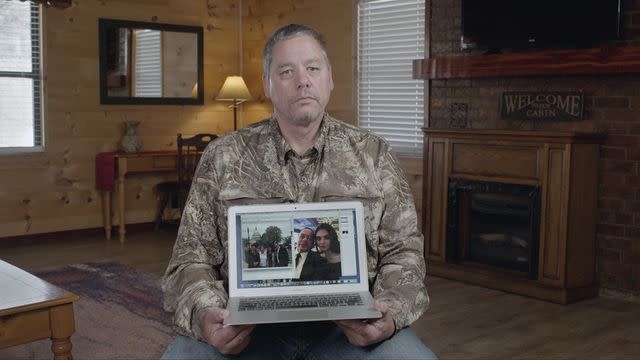
courtesy netflix
Wayne Maines holding a photo of his daughter Nicole.“I was so struck by this juxtaposition of these two worlds, and I thought, ‘Wow, that’s interesting.'” Fisher says. “I was like, ‘Well guys, I’d love to go on that trip with you and bring some cameras.’”
There’s a reason why, unlike other traditional documentaries, this short is only 10 minutes long and isn't more complex than needed.
“I wanted it to be an interior experience when you hear them talking about their own journeys and then to be this fly on the wall when you see them at the table,” Fisher continues. “I love when things are simple, but really much deeper than they appear on the surface.”
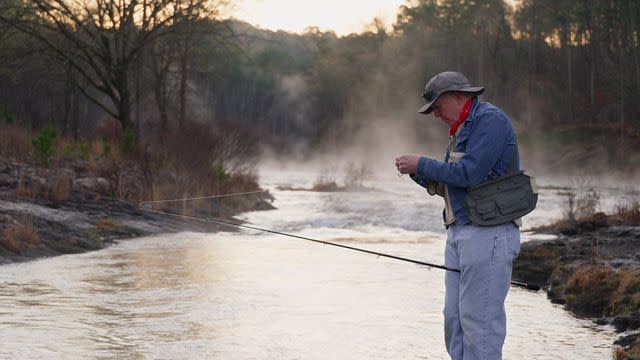
courtesy netflix
Dennis Shepard works with his fishing tackle before casting it out to the river.The latter was indeed true for Chukumba, a widower with four children, including his trans son Hobbes. As a Black man, he sums up the impact that being in a room with White men and Hispanic men from all parts of the country had on him: “Remarkable.”
“Literally, we could not have been more different,” Chukumba says. “And still, we spoke the same language. We had the same hearts. We saw life through many of the same lenses and experientially, we were in a place that we understood to be critical for ourselves and our children and our families."
By bonding with the other dads, Chukumba learned that he couldn’t move forward in his journey alone. Up until that point, he’d been “grappling” as a single father for years ever since his wife, Chanel, died in 2016.
Without a sense of community in the “hostile” outside world, he came to terms with just how much of an “illusion” the concept of a melting pot is in the United States.
“When you put some butter on a pan and it melts, it infuses that flavor, it infuses into the food that you put in that same pan,” Chukumba says. “Oftentimes, you don’t really see that happening. You see loggerheads, you see people at odds with one another. The beauty of this film is that this is the representation of a melting pot in its truest sense.”
Finding that sense of community began to sew up the hole of “isolation” in which he’d been living. Chukumba also envisioned how the bonding could serve as a “model” for the rest of the country in separating the “foolishness” from “what’s important.”
“We can see clearly that what binds us together is greater than that which separates us, and that’s what we cleave to,” he says. “That’s what we left that weekend with, was the fact that we have so much in common. If we hold onto that, we are stronger than separated.”
One aspect of that common thread was how their trans children caused them to reflect on their own upbringing and the relationships around them.
As a first-generation Nigerian born in the United States, Chukumba said he already had to wrestle with the dichotomy of both cultural identities. Unlike his family, who immigrated to the States, his entire understanding of the world had been contextualized from growing up in the U.S.
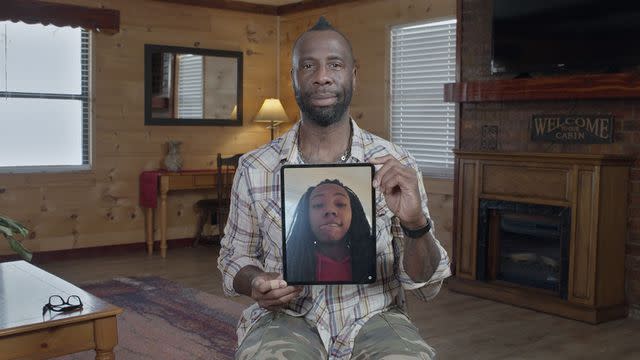
courtesy netflix
Stephen Chukumba holding a photo of his son Hobbes.“If you ask a Nigerian person about my trans son, they’re going to tell you that I’m living like an American,” Chukumba says. “I had to unlearn what the colonial masters taught us about who we were. I also had to help my people unlearn.”
“I didn't have a positive reception from my mother at first,” he added of telling his relatives about Hobbes. “She has since come along. I didn't have a positive reception from my brother at first. He has not yet come along. I still have family members who I will never share my child's identity with because they will not understand.”
He’s learned to “meet people where they are.” When not everyone has that “expansiveness of thought to understand and appreciate” gender-diverse youth, he says it’s better to focus on the people that he’s able to reach and bring along.
Unlearning personal biases and forgiving oneself for past mistakes have also been entire journeys for Shepard and former basketball player Wade.
Rather than dwelling on the past, Shepard says moving forward is “something you have to do.” Immediately after his son died, he worked with his wife, Judy, to start the Matthew Shepard Foundation on Dec. 1, 1998 to not only honor his life, but also advocate for the LGBTQ community.
“It’s always that fork in the road,” the Wyoming resident says. “You can either continue to live your life or you just feel sorry for yourself and fall back into a pity party that isn’t going to benefit you or anybody around you.”
Wade, a former Miami Heat guard, also experienced what it was like to challenge the “whole different mentality of how the world looked” that he grew up with when his then–12-year-old daughter, Zaya, came out as a transgender girl in 2020. Amidst the fear of the unknown, he leaned on his “village” while educating himself and reexamining how he shows up as a father.
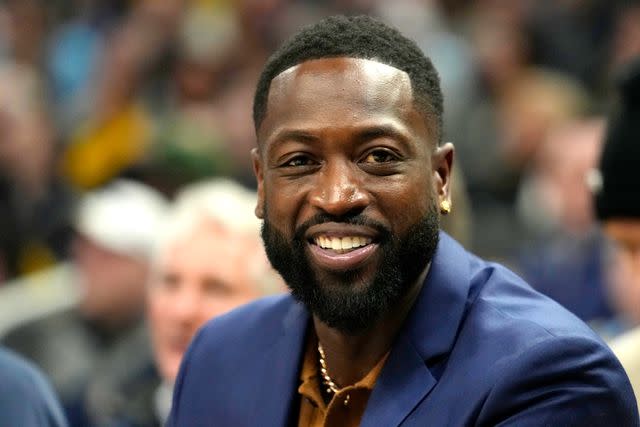
Patrick McDermott/Getty
Dwayne Wade is a co-executive producer of the documentary short.“It was one of them things when a kid found out there’s no Santa Clause,” he says of his initial shock. “You’re like, ‘Wait, what do you mean? I’ve been told this for so long.’”
“But also my job is also to move things forward. And if that means you're taking criticism or getting death threats or whatever it is that you get when you go against the status quo, that's a part of the journey.”
Fear was one of the emotions that hit Chukumba when his son first “invited him in” — his preferred phrase to the alternative, “came out.”
The dad was “terrified” not of his son’s identity, but because of his own ignorance. Rather than the fear and denial that so many other parents experience initially, he felt a surge of “fear and acceptance.”
“I accepted what my child told me because I knew what my child was telling me was true,” he recalls. “I didn't understand what my child was telling me, but I knew in the moment that he spoke those words, they were true. And so my job was to now disabuse myself of my ignorance and figure out everything I possibly could to be able to walk in that truth with him.”
He was able to quickly transform his fear into action — an ability that stemmed from the values of his late wife, “who set us all up for success.”
There’s a simple phrase that Chukumba turns to as a guiding light in the dark — “What would Chanel do?” According to him, she “would do all of her research.”
“When she passed, she instilled in me the importance of doing that work for my children,” he says. “So I’m going to go into the wilderness with the machete and I’m going to cut a path.”
Related: Parents Open Up About Helping People Embrace Their 12-Year-Old Son's Identity as Transgender
For Chukumba, that path includes imparting agency to his children to lead unlimited, “self-directed” lives.
“My goal has always been to give my children the sense of self that lets ‘em know that anything is possible, irrespective of what any person may think of them,” he says of his parenting style. “They’ve been raised to be world citizens, to not think of themselves as informed by being Americans, but by being humans and to let that humanity lead.”
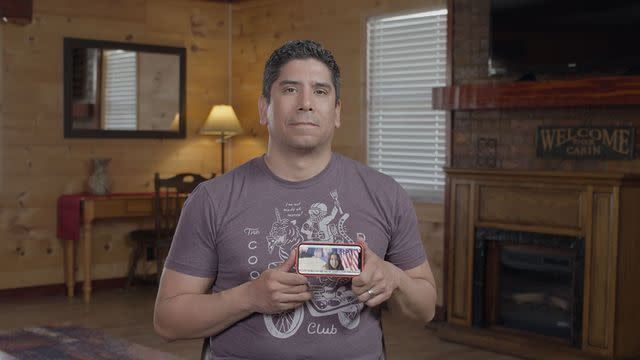
courtesy netflix
Frank Gonzales holding a photo of his daughter Libby.However, it’s certainly “very easy to go to a dark place” out of fear for his children. Rather than letting the darkness swallow him up, he’s chosen to look forward and focus on the opportunities they have here and now, because “no one is guaranteed tomorrow.”
This rings especially true given that Hobbes is preparing to attend college and leave the safety net of the home next year. Chukumba remembers a recent conversation between father and son, where he encouraged Hobbes to both share and protect his identity. Knowing how Matthew Shepard lost his life, he understands that it’s not always safe for his son to invite people into his identity.
Related: Matthew Shepard to be Interred at the Washington National Cathedral 20 Years After Murder
Making sure that his son has an “amazing sense of self” is key. That sense of self can be ever-evolving, and Shepard enjoys watching children embrace how they change as they grow older.
“All kids are different,” he says. “That’s what makes them so much fun and interesting, because it’s a trip of discovery for them as they’re growing up, and you’re seeing all these other people trying to shut down that journey of discovery where they don’t stand a chance to find out who they are and what they might want to do for the rest of their life.”
“It’s just really frustrating that you have people trying to shut others down just because they’re different. Well, look around. We’re all different.”
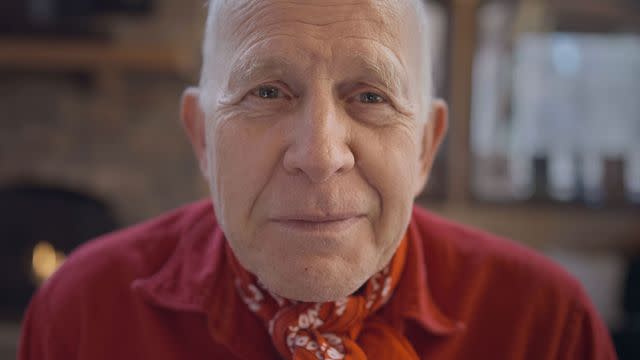
courtesy netflix
Dennis Shepard in The Dads.For Wade, he initially wanted Zaya to become a basketball player like him. While appearing on the Club Shay Shay podcast in September, the former NBA player, 41, expressed how his expectations shifted after Zaya came out as trans, adding, “See what happens when you start making plans for other people’s lives?”
Now, the basketball legend — who has five children, including a daughter he shares with his wife, actress Gabrielle Union — realizes that fatherhood “is not going to look the way you ever imagined it in your head.”
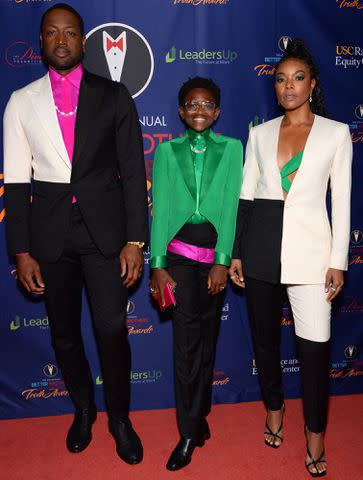
“Parents are not going to stop having dreams about a mini version of themselves. This is not going anywhere,” Wade says. “But in the midst of that, I think what I’ve learned is that it’s great to have a plan, but you have to also be able to adjust that plan once you get to meet your child — it’s as simple as that.”
Thanks to Zaya, who’s now 16, Wade says he’s getting better at adjusting for his younger children, son Xavier, 10, and daughter Kaavia James, 5.
Related: Dwyane Wade's Kids: Everything to Know
“Some of them may be just like you, some of them may be totally the opposite,” he adds. “What I’ve understood is I have no ownership of my kids. I don’t own them. I’m a vessel that was used to bring them into this world, and I have a responsibility, but that doesn’t mean ownership.”
Allowing his children to engage in the process of self-discovery has inevitably caused “friends” to distance themselves, just as it has for many of the other dads.
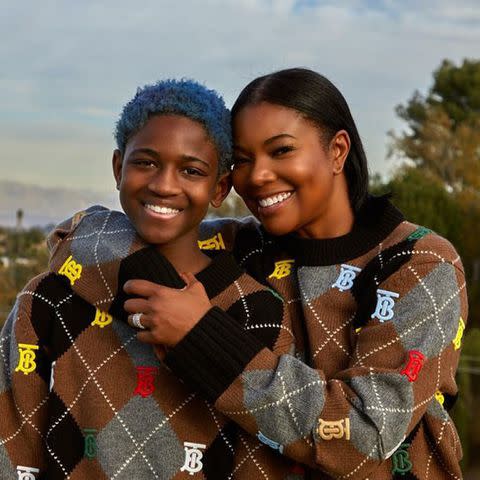
However, Wade doesn’t view that as a loss, but rather, as a "blessing."
“True friends, true family, true people love you and they love you no matter who you show up as and what you are,” he explains. “When we're saying ‘I love you,’ we use it so loosely and when things happen in life, it shows us who's real and who isn't. And so you don't lose friends, you actually get rid of some baggage when they fade away and the real shows up.”
Related: Dwyane Wade Says His Family Didn't 'Feel Protected' or 'Safe' in Florida (Exclusive)
Fisher hopes the documentary will reach people who have never met a trans person and might not be inclined to be accepting.
"That’s what I hope this movie can do — reach people who are in the margins, that are on the fence, that are curious, that are willing to expand their thinking, to accept testimony from people who are living on the front lines,” she says.
She launched the documentary earlier this year with a world premiere in March at South by Southwest. Just a day after the screening, Netflix came knocking.
“I was like, ‘Uh oh, something big is happening,’” Fisher recalls with a laugh. “Now, we’re going to be talking to the world.”
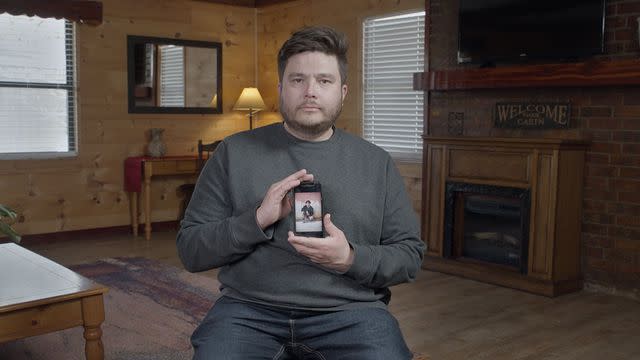
courtesy netflix
Jose Trujillo holding a photo of his son Dan.Accessibility was at the forefront of the filmmaker’s mind. That’s why she and her small crew took on the arduous task of cutting “a lot” of footage to create a final product that would be under 15 minutes.
“[The audience] wouldn’t feel like, ‘Oh my god, I have to give up 90 minutes of my day,’” Fisher says of her vision. “No, you can be changed in 10 minutes.”
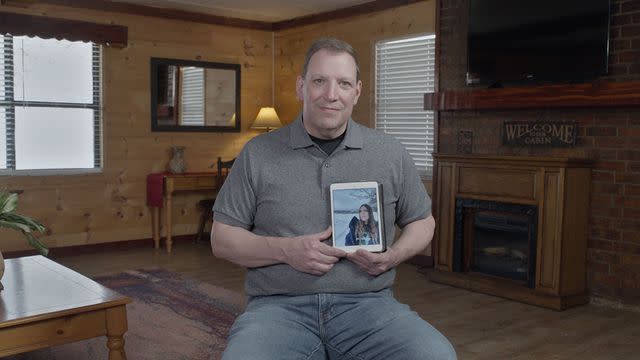
courtesy netflix
Peter Betz holding a photo of his daughter Samantha.Despite this goal, Wade still recognizes that many tend to not have the “capacity” of time and energy to learn about new issues unless it affects their personal lives, as he experienced himself. That’s why, instead of telling new audiences they “should” do something, he encourages them to “be open” to unexpected possibilities.
“I didn’t plan for Zaya to come to me and have that conversation, but when she did, thankfully, I have an open mind and I was open to what I didn’t know,” Wade says. “Don’t be desensitized to it because you haven’t had time to learn it.”
Shepard says he feels “no shame” in breaking down when he thinks about what happened to Matthew and what still happens to LGBTQ children today.
“There’s nothing wrong or embarrassing about that. You’re still a dad, you’re still a man, and I think you’re more of a man if you’re willing to show the other side.”
Although Chukumba recognizes the importance of being “always on” for his children as a role model, that doesn’t mean he won’t allow himself moments of vulnerability as well. In fact, he believes that crying is an “optimal state” to release his emotions.
“My wife died. My children have seen me cry. My mother and brother didn’t accept my son. My children have seen me cry,” he says. “I will never act like a moment of emotional tenderness is somehow weak. It’s part of the human condition.”
Never miss a story — sign up for PEOPLE's free daily newsletter to stay up-to-date on the best of what PEOPLE has to offer, from juicy celebrity news to compelling human interest stories.
Fisher also had moments of vulnerability while making the film. She recalls how during the fishing trip, the body of a black trans woman who went missing was found. The news struck her hard as the mother of a trans child and a sister to queer siblings, and as she walked into the kitchen where the dads were getting ready to film, they instinctively knew something was wrong.
“It was like a group hug in the kitchen, like six dads, just incredible,” Fisher says. “We as directors ask so much of the people who participate in our films that it's important to remember, for us to show up as well. And it's okay for us to show our vulnerability and that we are human.”
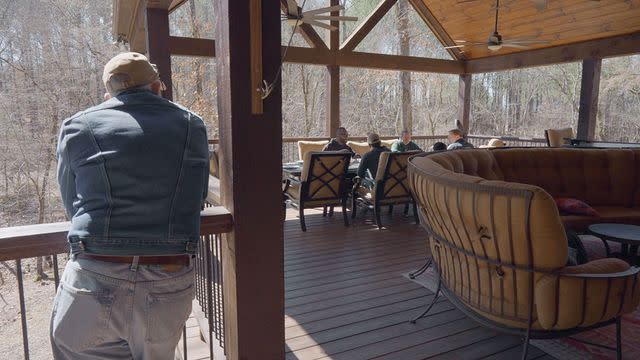
courtesy netflix
Dennis Shepard watches the other dads as they share their experiences over breakfast.After a night of marshmallow roasting by an open flame, the dads wake up the next morning ready to say goodbye. With a pat on each others’ backs, the men who entered as strangers are leaving as a family.
But they’ll be back, Fisher promises, after sharing that a second trip is already in the works with a potentially larger group of dads. It isn’t for the film, she says. It’s just “who they are.”
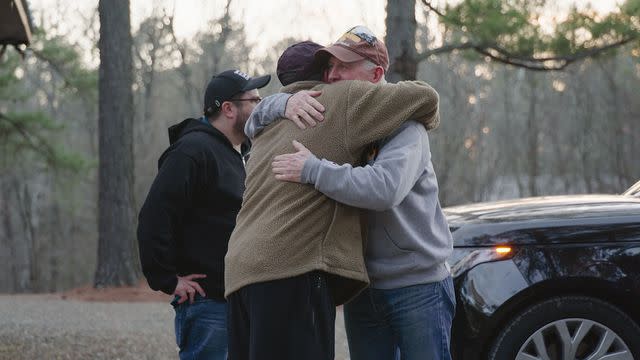
courtesy netflix
Dennis Shepard gives Wayne Maines a hug goodbye as all of the dads prepare to leave Oklahoma.
As the six dads leave the river behind to head back to their homes, the trees that blossom with the first signs of spring seem to mirror their hope for the future.
“We are not meant to go through life by ourselves,” Fisher says. “I do hope that in the 10 minutes that people are moved, that their hearts are shifted in some way and that they think about showing up for others.”
For more People news, make sure to sign up for our newsletter!
Read the original article on People.

